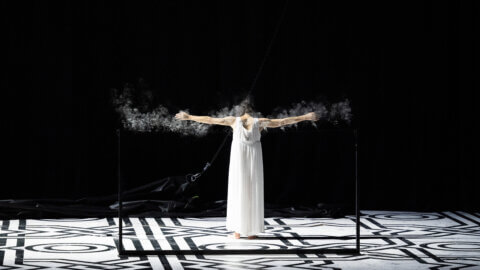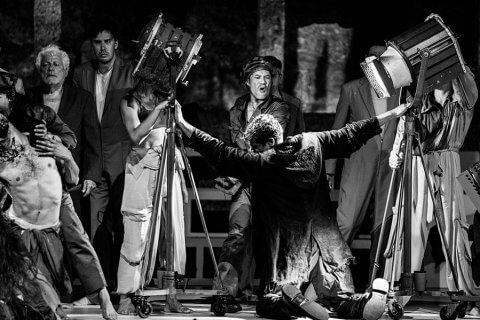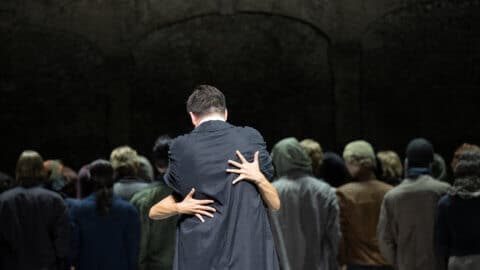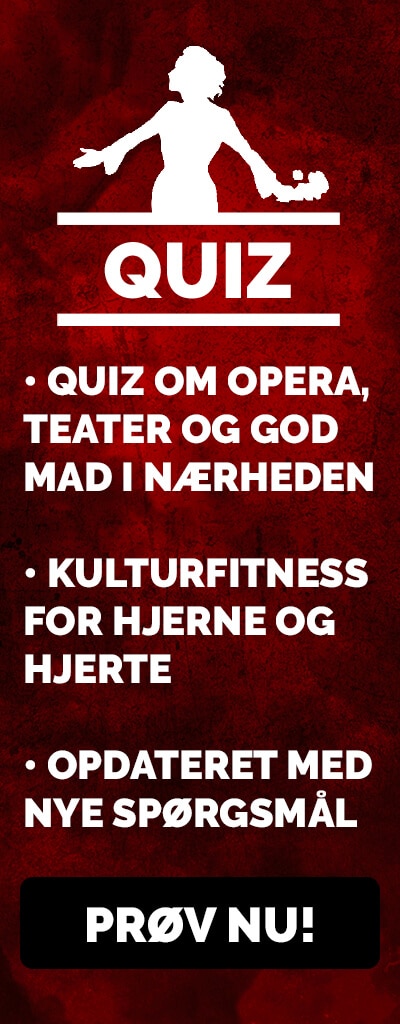ORLANDO • MADRID TEATRO REAL
★★★★★★

Photo: PR foto
REVIEW ORLANDO: DISTURBINGLY STRONG HÄNDEL IN MADRID
Somehow I always knew that action hero Chuck Norris would come out as countertenor. The physical resemblance is certainly striking in Christophe Damaux’s muscular portrayal of the killing machine Orlando in Händel’s baroque opera, which is a scoop in Claus Guth’s eye-catching staging and has now taken over the Teatro Real in Madrid. What a night at the opera!
The sought-after German stage director Claus Guth (64) is known for a string of remarkable, award-winning productions, often in provocative, but also thought-provoking, intelligently executed modernizations of classical opera material.
Here in Madrid’s majestic Teatro Real, he has set a semi-fashionable, low-key Florida apartment block on a huge revolving stage, complete with a profusion of tall palm trees and jungle-like, exotic vegetation growing wildly around a tangle of staircases and open galleries.
In front, he has put a half-decent food truck with sparse outdoor seating and dodgy string lights – while a potent, highly polished sports car has been thrown into the garage.
A getaway car that turns out to be the crank for the plot to unfold.
As the scene turns, we look into the trashed apartment of war veteran Orlando, or down to the drunk who has entrenched himself in the basement with bottles of booze, singing brandy and shouting life lessons.
The update is at once tightened to the edge and highly successful in its modernization of Handel’s 300-year-old work in this Vienna-Madrid co-production.
The plot is structured as a mischievous love maze where the warrior Orlando, a now PTSD-stricken Rambo clone, is lost in the choice between honor on the battlefield and success in love.
A ticking time bomb waiting to explode.
The characters, two men, two women and a kind of moderator who keeps the plot together, are pawns in a complicated lover-lover-not game of spurned love and jealousy run amok.
The singers are of the highest class, with convincing technical capacity in the many coloratura, added to a catchy, dramatic stage presence.
A taste of what’s to come is given shortly before the interval when Orlando learns that his beloved Angelica – the elementally sexy and incredibly well-sung Anna Prohaska – is about to take off in the sports car with Medoro, a rival suitor.
Orlando snaps, and like a reflection of his inner demons, video clips of napalm bombings from the Vietnam War suddenly flash on the gray concrete of the apartment building in all its colorful brutality. A gimmick that returns repeatedly whenever a loss of control is imminent.
In the meantime, two Anubis jackal-headed guys have snuck in and are enjoying their canned beer at the outdoor seating area.
Hola, what is up and down, what is real and what is nightmare? Claus Guth works with this sleepwalking aura in his skillful staging.
Quite a cliffhanger to go to intermission and sip cava with an immensely well-dressed Spanish opera audience in well-fitting suits, tight designer dresses, high shoes, tasteful scarves, sparkling brilliants and flashing sequins. It’s impressing style in Madrid.
The orchestra, the Monteverdi Continuo Ensemble, delivers a taut, distinctive Händel, aided by the Teatro Real’s slightly harsh acoustics under Ivor Bolton’s attentive direction.
A fine quality that peaks in the hit duet Dove Mi Trovo, which has the class of similar Händel largos such as Lascia Ch’io Pianga (Rinaldo) and Umbra Mai Fu (Xerxes), which you’re sure to recognize when you hear them. It’s okay to cry a little, so I did.
Part 2 is disturbingly powerful, with Orlando’s raging jealousy growing in increasingly unhinged sequences. Most stunningly in the scene where the two female characters appear in identical Snow White/Burger Bar uniforms and play an almost hallucinatory trick on Orlando.
Orlando captures Angelica, lashes her to a palm tree, douses her with gasoline and waves a Zippo lighter, which he doesn’t have time to light before he collapses and Angelica escapes.
Things get really nasty in the sequences where the well-trained Orlando paints his naked torso with war paint before embarking on what is shaping up to be a decisive showdown.
The whole thing is inspired by the Scorsese/De Niro film Taxi Driver and draws grim references to the outrageous stories of twisted incels going on mass shooting rampages at, for example, concerts and shopping malls, which we see with ever shorter intervals.
Orlando is rounded off in its original form with broad amnesty, cheerful forgiveness and a happy ending. Claus Guth closes the ball with more food for thought, however, as Orlando has emptied another can of gasoline over himself and his surroundings, waving his lit Zippo.
Will he drop the burning lighter and end it all? The answer flickers like flame in the wind as the lights cut to black and the curtain comes down to thunderous applause.
We can’t get past six stars from Got To See This.




